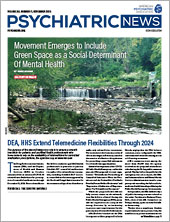For about 15 years, federal law has required insurance companies to cover treatment for mental disorders at the same level as medical/surgical care. Yet Tichianaa Armah, M.D., still has patients who must call a laundry list of psychiatrists before they find someone who is in network, even though the lists were provided by their insurance companies.
In August, Armah was joined by other psychiatrists and mental health advocates to describe examples like this directly to the people who have taken up the fight to crack down on insurers that are not complying with the federal parity law. Members of the Connecticut Psychiatric Society (CPS) and representatives of other mental health advocacy organizations met with Lisa Gomez, assistant secretary of the Department of Labor’s Employee Benefits Services Administration (EBSA), to discuss parity. Armah is chief psychiatry officer with Community Health Center Inc. and president of CPS.
EBSA was a core part of those new rules and continues its push to hold insurance companies accountable for mental health parity (
Psychiatric News, “
Federal Agency Declares It Is ‘Dead Set’ on Enforcing Parity”). Part of that push is meeting with psychiatrists and hearing how the failure to enforce parity impacts them. APA helped coordinate the meeting with CPS, Rep. Joe Courtney (D-Conn.), and EBSA.
During the meeting, Armah introduced the attendees and set up a roundtable discussion during which all were able to share their experiences. Mental health advocates like NAMI Connecticut and Mental Health Connecticut explained that patients cannot access the evidence-based mental health care they need, and psychiatrists from various practice settings explained how psychiatrists are often prevented from practicing the specialized care they were trained to provide.
“Patients who need higher levels of care like residential or inpatient treatment are subjected to what I would frankly call discrimination because it is impossible for them to afford the evidence-based care that professional organizations recommend,” said Andrew Gerber, M.D., who attended the meeting. Gerber is president and medical director of Silver Hill Hospital in New Canaan.
Living without parity isn’t sustainable, Armah said. “It doesn’t help us as a society to keep pushing people out of care,” she said. “It creates a snowball effect that nobody seemed ready to address.”
But that’s what is so exciting about the work that Gomez and her agency are doing, Armah continued. “We’re finally seeing someone say, ‘O.K., we’ve seen this over and over again, let’s make mental health parity a reality, not just pretty words on paper.’”
Psychiatrists are faced with numerous disincentives for taking insurance, the greatest being inadequate reimbursement. During the meeting, Lisa Harding, M.D., explained that she took a whole year before starting her private practice, Depression MD, so she could negotiate coverage rates with health plans to ensure she was paid fairly. She teaches a class on the business of medicine to students in the Department of Psychiatry at the Yale School of Medicine because so few psychiatrists know how to effectively advocate for themselves on the business side of private practice.
She pointed out that many psychiatrists are reimbursed less for providing care to patients than physicians in other specialties, even when they use the exact same billing codes. “How do you expect psychiatrists to pay their office staff, have an electronic health record, and pay their own salaries when they’re only getting about $90 per patient?” Harding said.
The meeting with EBSA was incredibly helpful because Gomez was able to explain the steps psychiatrists can take when they’re having issues with payors. Any psychiatrist who suspects that a health plan is not in compliance with the federal parity law can call EBSA at 1-866-444-3272. Further, Harding encouraged psychiatrists to get to know their regional EBSA offices.
“EBSA is on our side,” Harding said. “Get to know who you should call depending on what state you’re in. You have to let them know you exist and use them as a resource. They understand the rules that insurance companies have to play state by state, and hearing about the rules for payors in Connecticut was incredibly helpful.”
In fighting for parity, Harding, Armah, and Gerber urged psychiatrists to be organized in their approach, both at the state and national levels, and work to raise awareness about the issues.
Public opinion can be a powerful force, possibly even powerful enough to force insurance companies to change their policies, Gerber said. “We have to start to speak out with a unified voice and use our authority as a profession to make people aware of the injustices going on here,” he said. ■
Resources
Any physician who suspects that a health plan is not in compliance with MHPAEA can call EBSA at 1-866-444-3272 or visit
EBSA’s website.
APA members who need assistance with practice-related issues may contact APA’s Helpline at
[email protected] or (800) 343-4671.


